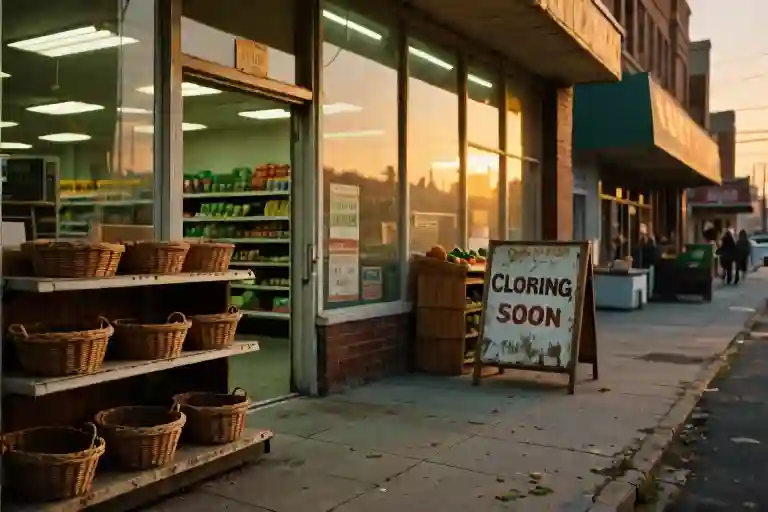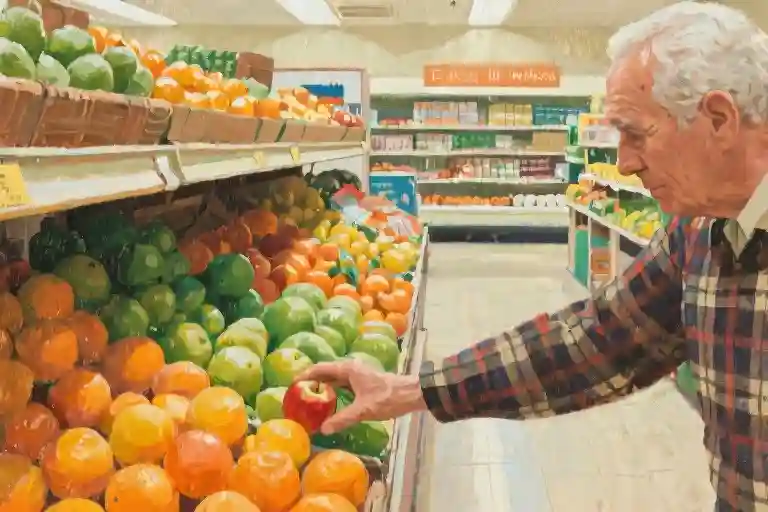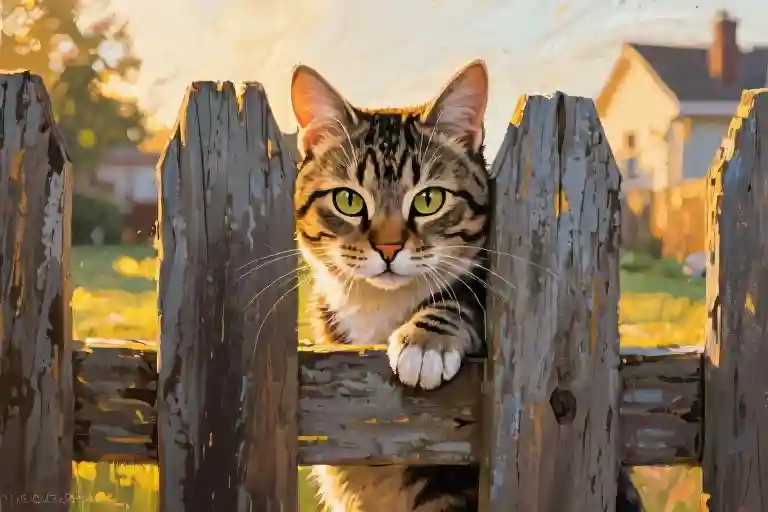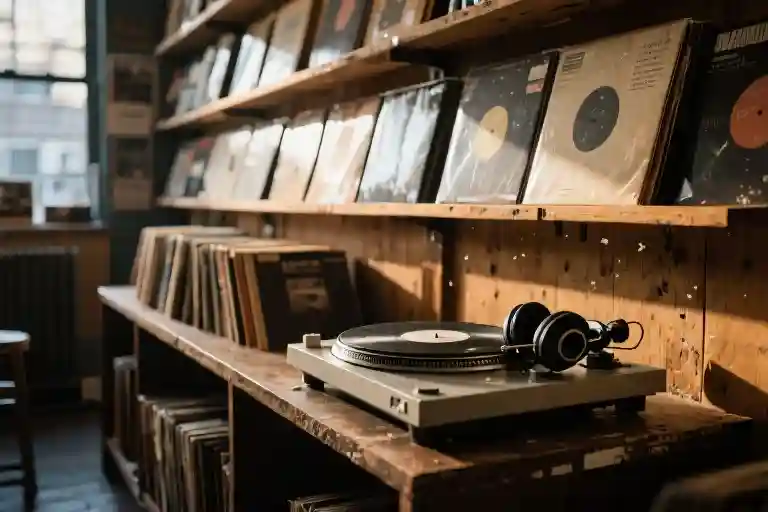The sidewalk sign hits me like a wrong note in a familiar song. White letters on red background—too cheerful for their message—announce the impending closure of Garden of Eden. My fingers tighten around the crumpled shopping list: peppermint tea, dark chocolate, the usual vodka that hasn’t been in stock since tariffs reshuffled the import game. The paper crackles as if protesting what we’re both realizing—this routine ends Sunday.
Joseph rocks gently by the market’s entrance, his rhythm as constant as the MetroCard swipes downstairs. When I press bills into his palm, his ‘God bless’ carries the same weight as always, though today it feels like we’re blessing each other. ‘Something hot?’ I ask, knowing he’ll request mac and cheese from the prepared foods section. The steam rising from those cardboard containers has warmed his hands through fifteen New York winters.
Inside, the reality lands harder. Aisles I’ve navigated blindfolded now play host to cardboard monoliths where cereal boxes once stood. The dried fruit display—usually bursting with apricots like miniature suns—bears an official notice confirming the sign outside wasn’t some sick prank. Twenty-six years. My twins learned to count by the cash registers here, their sticky fingers pointing at the glowing numbers as items got scanned.
What makes a grocery store more than shelves? The double doors that never made stroller entry a battle. The produce manager who kept Spanish onions separate from sweet Vidalias because Mrs. Rosenbaum swore they gave her heartburn. The way the apples lounge in their wicker throne room, glossy and self-assured while peaches blush briefly in their seasonal corner. These details built a geography of belonging that no chain supermarket app could map.
The manager passes with a box of pretzel bags, his tie still neatly knotted beneath the store logo. ‘You’ve been here the whole time,’ he says, and suddenly I’m twenty-three again, marveling at a market that stocked real vanilla beans next to the extract. My ‘I love this place’ comes out softer than intended, but he hears. His quiet ‘thank you for that’ carries twenty-six years of dawn deliveries and holiday shifts.
Near the citrus display, phantom giggles rise from the floor where two toddlers once played pass-the-lemon. The game was simple: Ava picks yellow, Ben chooses green, then ‘switch!’ until boredom set in. Now college students, they’d mock me for getting misty over fruit baskets—until I reminded them whose dorm care packages still arrive with Garden of Eden’s signature rosemary flatbread.
At the deli counter, the slicer hums its familiar song. The attendant—always more profile than full face—slides turkey across the glass with practiced ease. A child’s drawing taped to the case shows a lopsided heart beside the words ‘I like that you wer here.’ My throat tightens at the misspelling’s perfection. This man has fed my pastrami cravings and my mother’s last appetite with equal care, his back turned but his presence undeniable.
The cashier’s eyes crinkle above her mask—same smile since the pandemic turned us all into bandits. She rang up my panic-bought yeast in March 2020, my Thanksgiving pie ingredients during the nor’easter of ’16, the emergency ice cream when teenage heartbreak struck last June. ‘Come every day,’ she urges when I ask about final hours, and I realize these aisles hold the soundtrack to my adulthood—beeping scanners, rustling bags, and always, underneath, the steady beat of a neighborhood breathing together.
The Anatomy of a Neighborhood Heartbeat
The double doors were why I first fell in love with Garden of Eden. Not their polished brass handles or the way they swung open with theatrical grace—though those didn’t hurt—but because they accommodated my double stroller without requiring the awkward sideways shuffle that turned grocery trips into obstacle courses. In a city where most storefronts seemed designed to repel parents, those doors whispered ‘come in, we’ve made space for your life.’
Above the entrance, baskets dangled from the ceiling like inverted constellations. Wicker spheres holding dried flowers, braids of garlic, and miniature pumpkins in season. They never served any practical purpose I could discern, yet their presence signaled something essential: this wasn’t a place that prioritized efficiency over character. The floral attendant proved it weekly when he’d disappear into the back room, emerging with tulips so fresh their petals still carried greenhouse warmth. ‘These just came in,’ he’d say, as if we were co-conspirators in a secret transaction.
During the pandemic’s darkest weeks, when my bandana mask kept fogging my glasses and sidewalk arrows dictated our movements, Garden of Eden remained the only illuminated storefront on our block. The glow from its windows cut through the 6pm curfews, a beacon confirming that certain rhythms persisted. I’d watch gloved cashiers ring up quinoa and sanitizer with the same deliberate care they’d once given to my daughters’ Halloween candy purchases. Their presence became a quiet rebellion against paralysis—proof that some people still showed up, still kept the doors open, still remembered your usual order when the world outside seemed to have forgotten how to function.
What we call neighborhood institutions are really just collections of these small steadfastnesses. The way the stock boy would pretend not to see me stealing a grape from the display. How the bakery clerk saved the last challah every Friday until 3pm, knowing I’d come racing in after school pickup. That time during the blackout when they operated the registers by candlelight, calculating sales tax on scrap paper. These weren’t amenities listed on any store map, but the invisible architecture that turned transactions into relationships.
The real heartbeat of a community doesn’t live in its zoning laws or business improvement districts. It pulses in the spaces between a stroller’s wheels and a doorway’s frame, in the way certain lights stay on when others go dark.
Beauty Queens in Wicker Baskets
The apples at Garden of Eden never begged for attention. They simply knew they’d be chosen, resting in their tissue paper gowns like seasoned pageant winners who’d outlasted flashier competitors. While peaches blushed and nectarines shone with temporary summer glamour, the apples held court year-round – their waxy skins catching the light in a way that said ‘We remember when these floors were new.’
I used to wheel the twins’ stroller directly to the citrus section first, their small hands already reaching before I gave the ritual command. ‘Ava picks lemon, Ben gets lime,’ I’d announce, watching their serious faces as they inspected each fruit with the gravity of sommeliers. The baskets sat at perfect toddler height, as if the store designers had anticipated this daily ceremony. Later, when restlessness hit during my endless debate between light and dark brown sugar, a simple ‘switch!’ would send their sticky hands exchanging fruits with disproportionate delight.
There was something comforting about the apples’ quiet dominance. Unlike the fragile stone fruits that demanded immediate consumption, apples tolerated indecision. They understood human fallibility – that sometimes you needed three days to remember why you’d bought them. The peaches might whisper ‘eat me now,’ but the apples just said ‘We’ll be here.’ And they always were, until suddenly they wouldn’t be.
The empty dairy shelves today make the apples’ confidence seem almost tragic. I run my fingers along the wicker baskets that will soon stop cradling their polished residents. Nearby, a single forgotten lime rolls forlornly beneath the display – no small hand waiting to claim it. I pick it up and inhale the piercing scent that used to make the twins wrinkle their noses. The smell hasn’t changed, but the ritual has. Ben now prefers energy drinks to citrus, while Ava’s gone vegan. The apples outlasted my children’s childhood, but not this neighborhood’s shifting economics.
At the back of the produce section, the flower vendor’s stool sits empty. He’d sometimes slip my mother gardenias when her chemo made eating impossible. ‘For the smell,’ he’d say, refusing payment. The apples never gave free samples, but they offered something else – the illusion of permanence in a city that reinvents itself hourly. As I place the stray lime back in its basket, I realize we weren’t just choosing fruit all those years. We were voting with every purchase for the kind of world we wanted to live in – one where beauty queens still held court in wicker baskets, and someone remembered how you took your coffee.
Backstage Heroes
The dairy section’s emptiness hits harder than I expected. Glass shelves that usually hold organic milk and artisanal yogurts now reflect fluorescent lights like abandoned mirrors. The handsome manager walks past carrying a box of pretzel bags, his tie still perfectly knosed against his collar. There’s something about the way he adjusts it with his free hand – that small gesture of dignity while dismantling his life’s work.
‘You’ve been here the whole time,’ he says when I voice my disbelief. The observation lands with unexpected weight. Twenty-five years of my grocery runs witnessed by this man who now knows the exact curvature of my children’s growth spurts through the items in my cart. From formula jars to energy drinks, he’s rung them all up without comment.
At the deli counter, the familiar hum of the meat slicer provides odd comfort. The attendant’s back remains turned as always, shoulders moving in rhythmic precision. A child’s crayon drawing taped to the glass – that questionable shark-smile – makes my throat tighten. When he hands over the turkey slices, our fingers brush briefly over the wax paper. No gloves today. The pandemic’s over, at least in this small way.
‘You’ve been here as long as me,’ he remarks, and I realize we’ve had hundreds of conversations where I’ve only ever seen his profile. There’s intimacy in these half-hidden interactions, in the way he’d dangle pastrami samples without turning, knowing exactly when my hand would reach. His shrug about future employment speaks volumes about what happens to specialists when their stages disappear.
The checkout line feels like visiting hours. The cashier – not the original baby-cooing one, but her spiritual successor – beams as she scans my peppermint tea. Her smile’s the same one that greeted me during chemo when I’d buy ginger ale at 3am, during the divorce when my cart held only wine and frozen dinners, on that first terrifying day of mask mandates when we all moved like ghosts. These women don’t just remember your groceries; they remember your life chapters.
‘You’ve been here for this neighborhood,’ I tell her, watching her fingers fly over the keyboard. She could probably operate this machine blindfolded after fifteen years. The way she bags items – heavy bottoms, fragile tops – could qualify as a municipal service. When she mentions hoping for more hours at Gristedes, I bite my tongue against pointing out how their tomatoes never taste right. Some goodbyes don’t need verbalizing.
As I exit past Joseph still rocking by the entrance, it strikes me that community isn’t built through grand gestures but through these minuscule consistencies: The manager’s tie. The deli man’s turned back. The cashier’s muscle memory. These people have performed their roles so well for so long that we forgot they were performing at all. The real tragedy isn’t losing a grocery store – it’s losing the invisible choreography of ordinary heroes who made it sing.
The Last Three Visits
The announcement still didn’t feel real when I pushed through those familiar double doors the next morning. My basket held the flimsiest of excuses – Passover needed horseradish, the kind only Garden of Eden’s deli counter would grate fresh into little containers that left my fingertips tingling for hours. I moved slower than usual past the dwindling citrus display, running my hand along the wicker edge where Ava and Ben used to play their switching game.
At the gluten-free aisle, I grabbed two boxes of Patti’s favorite crackers instead of one. The cashier raised an eyebrow at my unnecessary stockpiling. “She’ll think I’m anticipating the apocalypse,” I said, and we shared the kind of laugh that comes when you both know the real catastrophe is already happening. The scanner beeped like a heart monitor as she rang up my coping mechanisms – dark chocolate, peppermint tea, and that absurdly large jar of artichoke hearts I’d never normally buy.
Day two found me lingering by the pretzel bins where Ben discovered his beloved extra-dark variety years ago. The remaining bags sat like abandoned chess pieces in a game we’d lost. Behind the deli counter, my pastrami-slicing friend hummed as he wiped down equipment already gleaming clean. “You making sandwiches for the whole block?” he asked when I ordered triple my usual turkey. I shook my head, suddenly embarrassed by my transparent attempt to stretch these final interactions. His knife made its familiar rhythmic click against the slicer’s guard, a sound I realized I could probably pick out in a crowded room.
By the third visit, reality had stripped the shelves bare. The dairy case’s humming emptiness echoed through the store. I ran my fingers along the cold glass where the honey-goat cheese used to sit, remembering how Ava would press her nose against this very spot as a toddler, fogging up the glass with excited breath. Near the entrance, someone had stacked empty produce baskets into a precarious tower. The hanging ones above swayed slightly, as if the ceiling itself was sighing.
At checkout, the pretty cashier didn’t comment on my nearly empty basket. Instead, she told me about the first time she saw my twins – how Ben had thrown an apple like a baseball and Ava had lectured him with surprising eloquence for a three-year-old. We both pretended not to notice when my hand trembled handing over cash. The receipt felt heavier than usual, though it listed only peppermint tea and a single chocolate bar – my original shopping list from a lifetime ago when I still believed some places would always be there.
Outside, the spring sunlight hit differently. I turned for one last look at the awning where rain had pooled during a thousand quick grocery runs. The automatic doors wheezed shut behind me with finality, taking with them twenty-six years of my life’s ordinary miracles – the forgotten ingredient emergencies, the snow day feasts, the way a simple market can become the quiet backbone of a neighborhood. Walking away, I crushed the receipt in my pocket like a love letter I’d never send.
The automatic doors hissed open for the last time, that familiar mechanical sigh I’d heard nearly every day for twenty-six years now carrying an extra weight. I didn’t take my phone out to photograph the empty shelves. Some goodbyes demand to be felt rather than documented, their power lying in the way your throat tightens when you realize this particular configuration of light falling through the front windows will never happen again exactly like this.
A cashier I didn’t recognize was dismantling a display of Italian cookies near the entrance. We exchanged the kind of smile people share at funerals – acknowledging the loss without having the right words. The scent of bleach mixed with lingering traces of the floral department’s peonies created that uniquely Garden of Eden aroma one last time. I breathed it in like someone memorizing a lover’s perfume before an ocean separates them.
At the dairy case where my twins used to press their noses against the glass choosing yogurts, the refrigeration units stood unplugged, their usual hum replaced by an eerie silence. I ran my fingers along the edge of a shelf where the price tags for organic milk still clung stubbornly. Nearby, someone had abandoned a single shopping basket upturned near the empty bulk bins, its wire frame looking oddly vulnerable without groceries to carry.
The pretty cashier from my last visit spotted me and waved from her station, where she was boxing up register tape. ‘You came back,’ she called across the quiet store. Not a question, but an acknowledgment that of course I had – that people like us who built our lives around this place would need to witness its final days. I nodded and held up the dark chocolate bar and peppermint tea in my hands, my standard purchase now transformed into a ceremonial offering.
When the automatic doors sighed shut behind me for the final time, I didn’t turn around. Some memories don’t need visual reinforcement – the way Joseph’s hands always trembled slightly when accepting hot coffee, the particular squeak of the manager’s shoes as he crossed the tile floor, the metallic ping of the bread tongs being set down after selecting a baguette. These sensory imprints had already woven themselves into my muscle memory.
Goodbye, dear friend. The words formed soundlessly as I walked away from the building that had witnessed so much of my ordinary, extraordinary life. Not just a grocery store, but the keeper of first steps and last meals, of small talk that became lifelines, of flavors that marked seasons and celebrations. The mechanical click of those double doors locking for the last time carried the quiet finality of a book closing – one I hadn’t realized I’d been co-writing with my community for over two decades.






Outstanding post, I conceive blog owners should acquire a lot from this web site its really user pleasant.